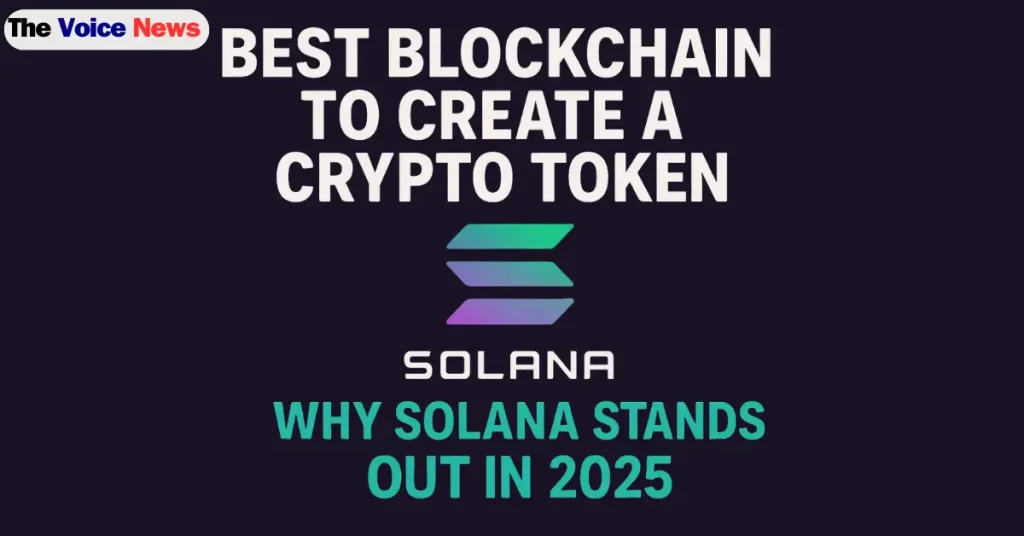Creating a crypto token has become a popular way for entrepreneurs, developers, and businesses to launch innovative projects in the blockchain and decentralized finance (DeFi) space. Whether your goal is to develop a decentralized app, launch a gaming token, or build a community-driven asset, picking the right blockchain is a critical first step. The blockchain you choose will directly impact your project’s scalability, cost, user experience, and ecosystem support.
This article explores the best blockchain platforms available for creating a crypto token in 2025, focusing on essential criteria such as transaction speed, cost, ease of token creation, and ecosystem maturity. Among these, Solana emerges as a top contender — praised for its high throughput, ultra-low fees, and developer-friendly approach.
What Makes a Blockchain the Best for Creating Crypto Tokens?
Before diving into platform comparisons, it’s important to understand the criteria that define the “best blockchain” for token creation. Choosing a blockchain is not just about price or speed alone — it’s about the entire experience and future-proofing your project.
Here are the key factors to consider when selecting a blockchain for your token:
1. Transaction Speed and Throughput
Your blockchain should handle large volumes of transactions quickly. Token transfers, airdrops, and trades need fast finality to maintain a seamless user experience.
2. Transaction Cost
Low fees are essential to encourage token use, especially for micropayments or projects with high transaction volumes. Expensive gas fees can stifle adoption.
3. Ease of Token Creation
The blockchain should offer simple, well-documented token standards and tools. Not every developer is an expert in complex smart contract coding, so streamlined solutions matter.
4. Ecosystem and Adoption
Your token’s success partly depends on how well it integrates with wallets, decentralized applications (dApps), and exchanges. A large, active ecosystem also means more liquidity and partnerships.
5. Scalability
Your project may grow rapidly. The blockchain must scale smoothly without performance drops or prohibitive costs.
6. Security and Stability
Choose a blockchain with a strong security track record supported by a stable network and a resilient consensus mechanism.
Comparing Popular Blockchains for Token Creation in 2025
Let’s compare some of the major blockchains commonly used for creating crypto tokens, evaluating how they stack up on the criteria outlined above.
Ethereum
- Transaction Speed: Around 15 transactions per second (TPS), which limits scalability on the base layer.
- Transaction Cost: Generally high gas fees, ranging from $1 to over $20 per transaction, especially during network congestion.
- Token Creation: ERC-20 standard is widely used, with many established tools and tutorials.
- Ecosystem: The largest and most mature, featuring the most wallets, exchanges, and dApps.
- Scalability: Pending upgrades (Ethereum 2.0 and layer-2 solutions) aim to improve performance.
- Security: Battle-tested, highly decentralized and secure.
Summary: Ethereum remains the go-to for projects prioritizing liquidity and ecosystem maturity despite high fees and scalability challenges.
Binance Smart Chain (BSC)
- Transaction Speed: Fast compared to Ethereum (~60 TPS).
- Transaction Cost: Low fees, making microtransactions more feasible.
- Token Creation: Uses BEP-20 standard, similar to Ethereum’s ERC-20.
- Ecosystem: Growing rapidly, especially for quick DeFi launches.
- Scalability: Better than Ethereum’s main net thanks to fewer nodes.
- Security: More centralized, raising concerns for some users.
Summary: BSC is attractive for cost-conscious projects seeking speed and ecosystem growth but trades off some decentralization.
Polygon (Ethereum Layer 2 Sidechain)
- Transaction Speed: Hundreds of TPS.
- Transaction Cost: Very low fees.
- Token Creation: Compatible with Ethereum token standards.
- Ecosystem: Benefits from Ethereum’s brand and security.
- Scalability: Layer 2 solution designed to improve Ethereum’s limitations.
- Security: Relies partly on Ethereum for security.
Summary: Polygon balances cost, speed, and security by leveraging Ethereum’s ecosystem with added scalability.
Cardano and Algorand
- Cardano: Utilizes native tokens with strong emphasis on formal verification and security. Still developing ecosystem with growing adoption.
- Algorand: Known for speed (1,000+ TPS), low costs, and straightforward token creation (ASA standard).
Summary: Both offer interesting alternatives, especially for projects valuing security and simplicity over ecosystem size.
Why Solana Is Often the Best Blockchain to Create a Crypto Token
After exploring the major options, Solana consistently shines for projects seeking a combination of speed, low cost, easy token creation, and scalability. Here’s why Solana ranks highly among developers and entrepreneurs in 2025:
1. Ultra-High Throughput and Low Latency
Solana can theoretically process up to 65,000 TPS with a block confirmation time of around 400 milliseconds. This means token transfers and other on-chain interactions settle near-instantly, providing a real-time feel critical for gaming tokens, DeFi transactions, and micropayments.
2. Ultra-Low Transaction Fees
Transaction fees on Solana typically cost less than a penny — often well under $0.01. This is a game-changer compared to Ethereum where a simple token transfer can cost $5 or more during congestion. For projects aiming at frequent transactions or micropayments, Solana’s low cost removes a major barrier to adoption.
3. Scalability without Layer 2
Solana’s design supports scaling on the base layer itself, eliminating the need for complex layer-2 solutions. This means your token can smoothly accommodate a rapidly expanding user base without significant changes or migration.
4. Simple and Robust Token Creation via SPL Standard
Solana uses the SPL token standard, which is straightforward to implement. Unlike Ethereum, where developers typically write custom ERC-20 smart contracts (introducing potential bugs), Solana offers a pre-audited, built-in token program for creating tokens without coding smart contracts from scratch.
This makes token creation accessible to less technical users, and safer since the core token logic has been reviewed extensively. Additionally, many no-code and low-code tools help launch SPL tokens within minutes.
5. Growing and Supportive Ecosystem
Though younger than Ethereum’s, Solana’s ecosystem has expanded rapidly. Most popular wallets support SPL tokens seamlessly. Decentralized exchanges like Serum, Raydium, and Orca enable liquidity pools and trading for Solana tokens. Its growing DeFi and NFT platforms mean your token can integrate easily into emerging applications.
Plus, Solana’s active developer community offers hackathons, grants, and educational resources to foster innovative projects using its network.
Potential Downsides of Solana and How to Navigate Them
While Solana has many advantages, no blockchain is perfect. Understanding potential challenges helps you plan better.
- Network Outages: Solana has experienced intermittent outages in the past due to its complex consensus mechanism and high throughput. However, the development team is actively improving stability and these incidents have become less frequent.
- Validator Hardware Requirements: Solana’s high-performance architecture demands powerful hardware from network validators. This raises centralization concerns compared to blockchains like Ethereum that run on lower specs, though Solana still maintains hundreds of validators.
- Rust Programming Learning Curve: For developers writing custom smart contracts (called programs on Solana), programming in Rust can be challenging. However, for simple token creation using the standard SPL token program, deep Rust knowledge is unnecessary.
For projects prioritizing uptime (stablecoins, critical financial apps), these factors should be weighed carefully. Still, for many tokens — especially in gaming, social, or DeFi projects — Solana’s benefits typically outweigh these challenges.
Alternative Options Depending on Your Needs
If your project has specific requirements, consider these alternatives:
- Ethereum: If liquidity, exchange listings, and the largest ecosystem are your top priorities and you can tolerate higher fees and slower speeds, Ethereum remains the dominant platform.
- Binance Smart Chain: Ideal for quick launches where cost matters and decentralization is less of a concern.
- Polygon: If you want Ethereum compatibility with better fees and reasonable speeds.
- Algorand or Cardano: Good if ease of token creation, security, and formal verifications are your focus, accepting smaller ecosystems.
Practical Steps to Create a Token on Solana
If you’ve decided Solana fits your needs, here’s a simplified overview of the token creation process:
- Set Up a Solana Wallet: Use wallets like Phantom or Solflare to interact with the network.
- Get Test Tokens: Use the Solana devnet or testnet to experiment without spending real SOL.
- Use Token Creation Tools: Utilize Solana CLI commands or no-code tools that leverage the official SPL token program.
- Deploy Your Token: Mint your token. Optionally configure supply, decimals, and freeze authority.
- List Your Token: Connect with DeFi platforms or exchanges supporting SPL tokens for liquidity and trading.
Many guides and community tutorials make this process approachable even if you’re not an advanced developer.
Conclusion: Solana — The Best Blockchain Choice for Most New Crypto Tokens in 2025
Selecting the blockchain to create your crypto token is a foundational decision impacting your project’s performance, user adoption, and long-term success. While Ethereum’s dominance and wide adoption keep it relevant, Solana’s ability to deliver blazing-fast transactions, ultra-low fees, scalability, and a user-friendly token creation experience puts it at the forefront of blockchain platforms in 2025.
For developers and businesses building tokens that require frequent on-chain activity—such as gaming tokens, micropayments, and fast DeFi operations—Solana offers an unmatched combination of speed, affordability, and ecosystem growth.
If you prioritize performance, cost-efficiency, and smooth user experience for your token holders, Solana is arguably the best blockchain to create your crypto token today.


